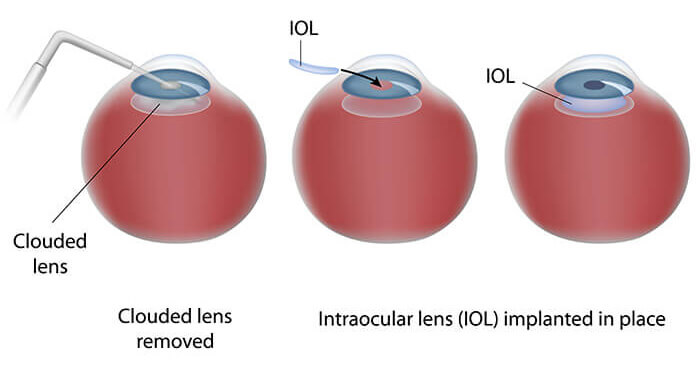A cataract is a build-up of protein on the eye’s lens. As we get older, the proteins in the eyes start migrating towards the center of the eye. This slow progression leads to a cataract forming out of the clump of proteins on the lens. When you have a cataract, you may not notice until you start losing vision.
Common symptoms of cataracts include:
As a cataract develops, these symptoms become more obvious and harder to ignore. Even though you may have a cataract, it doesn’t always mean you need cataract surgery right away.
Cataract surgery is a procedure that removes the natural lens inside of the eye and replaces it with an intraocular lens (IOL.) Cataract surgery is widely accepted as a safe and routine procedure, not to mention it is one of the most performed procedures in the world. At Bowden Eye & Associates, we proudly offer premier cataract surgery services to our patients.

At our Jacksonville surgical facility, eye drops will be put into your eye to dilate the pupil. The area around your eye will be washed and cleansed. After the proper anesthesia and numbing of the eye your cataract surgeon will create a small incision in your eye.
Modern-day cataract surgery is also called microsurgery because the incision sizes have become so small. Luckily, cataract surgery is one of the safest and most performed surgeries. Ninety percent of patients that undergo cataract surgery report significantly improved vision afterward. The surgery only lasts for about an hour.
Once the incision is made, the cataract surgeon will insert a probe to break up the cloudy cataract and then proceed to remove the material. A suction tube will remove all of the loose debris and the capsular bag is prepared for the artificial IOL implant. The foldable IOL is then inserted through a tube and unfolds once in place. Intraocular lenses will have haptics and “lens arms” to hold it in place.
With the cataract removed and the IOL in place, light can once again travel unimpeded to the back of the eye and focus on the retina where the image is interpreted and transmitted to the brain. There are many types of IOLs to choose from, and your cataract surgeon will determine which is best for you. Many patients report that their eyesight after cataract surgery is even better than before they developed cataracts! The end result is a clear, youthful vision.
Gone are the days of long hospital stays for cataract surgery. Our cataract services not only make sure you get the most premier team of Jacksonville cataract surgeons, but we also give you the latest technology the cataract field has to offer. Improvements in this surgical field have made this a very short procedure where most recovery can occur at home.
“It gives us more accuracy and precision in performing some of the critical steps of cataract surgery. There’s nothing wrong with traditional surgery when it’s done well, but studies have shown using the laser compared to the manual technique has improved outcomes.”
–Sarah Darbandi, MD
Schedule an appointment online or call our office at (904) 296-0098.